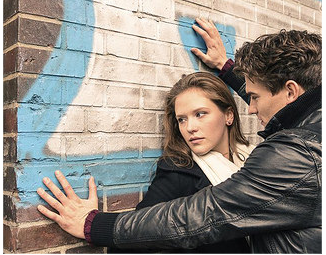Teen Dating Violence
According to recent statistics, one in four teenagers has experienced violence in a dating relationship. Dating violence can take many forms:
- psychological and emotional abuse
- physical abuse
- sexual abuse
Dating violence can occur between two people who are currently in a casual dating relationship or in a long-term serious relationship or who were formerly involved in a dating relationship. In dating violence, one partner tries to maintain power and control over the other partner through abuse. Dating violence is not about getting angry or having a disagreement. In an abusive relationship one partner is afraid of or intimidated by the other. Dating violence crosses all socio-economic, ethnic, cultural, and religious lines. Dating violence occurs in heterosexual and gay and lesbian relationships.
Relationship violence can occur at school — in the hall, in the classroom, in the parking lot, on the bus or in a car, at after-school activities, at a student’s workplace, at a school dance, or at a student’s home. In teenage dating relationships, the abuse is often public with peers witnessing the abuse; however, the abuse can also occur in private.
Warning Signs of an Abusive Relationship
If you can answer “yes” to any of the following questions, then your partner is being abusive:
- Are you afraid of your partner or afraid to break up?
- Does your partner call you names, make you feel stupid, or tell you you can’t do anything right?
- Is your partner extremely jealous?
- Does your partner tell you where to go and who you can and cannot talk to?
- Does your partner tell you that no one else will ever go out with you?
- Do you feel cut off from family and friends?
- Do you feel threatened if you say no to touching or sex?
- Have you ever been blamed for having been abused?
- Has your partner, grabbed, hit, punched, held you down or kicked you?
- Is your partner really nice sometimes and really mean at other times (almost like he has two different personalities)?
- Does your partner make frequent promises to change or say he will never hurt you again?
Remember that you have the right to a healthy relationship. You do not deserve to be abused. You have done nothing wrong, and the abuse is not your fault.
The longer you stay in an abusive relationship, the more intense the violence will become. It will not get better over time. Learn about the Cycles of Abuse.
Common Signs That Indicate That A Teenager May Be Experiencing Dating Violence:
Shows dramatic changes in body size, clothing, grades and outlook on life, mood and personality
Shows physical signs of injury
Is truant or drops out of school
Becomes more and more isolated from family and friends
Gives up favorite activities
Minimizes their partner’s behavior and makes excuses for them
What To Do If You Want To Leave
- Talk to your parents, another family member, a friend, your physician, a counselor, a clergy person, or someone else you trust. If you remain isolated from family and friends, your abuser has more opportunity to control you.
- Get help from professionals. Many domestic violence programs offer services for teens.
- Educate yourself.
- Keep a log of the abuse. You may need it as evidence if you have to take legal action.
- Do not meet the abuser alone. Do not let the abuser in your home or car when you are alone. Avoid being alone at school, your job, or on the way to and from places.
- Always tell someone where you are going and when you plan to be back. Check in frequently.
- Develop a safety plan and rehearse what you will do if the abuser becomes abusive.
- Choose to not have sex or choose safe sex.
- Give yourself some space. Take a break from dating.
Tips For Supporting Your Teen
- It is never too early to teach self -respect. No one has the right to tell your teenager who to see, what to do, or what to wear. No one has the right to hit or control anyone else.
- If you suspect that your teen is already involved with an abusive partner, tell your teen you are there to help not to judge. If your teenager doesn’t want to talk with you, help your teenager find another trusted person to talk with.
- Give your teenager a chance to talk. Listen quietly to the whole story.
- Focus on your teen. Do not put down the abusive partner. Point out how unhappy your teenager seems to be with the person.
- If your teenager tries to break up with an abusive partner, advise that the break-up be definite and final. Support your teenager’s decision and be ready to help.
- Get advice from teen dating violence prevention hotlines or teen counselors how to support your child through a relationship break-up.
- Take whatever safety measures are necessary. Have friends available so your teen does not have to walk alone. Consider changing class schedules or getting help from a guidance counselor, school principal, or the police, if necessary.
Source: www.eap.partners.org/
Ending a relationship can be hard for everyone involved. Hurt, frustration, anger, and sometimes a sense of relief can make break-ups feel overwhelming. Regardless of the emotions you are feeling, it is important to think about how you will act so that you can have a healthy break-up.
The Social Breakup
How Social Media May Affect Your Breakup
- There are challenges to having a public relationship
- Posting your relationship status puts your relationship on display. Therefore your breakup will become public information.
- Posting pictures, comments, statuses, etc. to hurt your ex intentionally is harmful and abusive.
- Constant reminders of your ex, such as status updates and photos, may be painful and make it difficult to move on. You may be tempted to overanalyze your profile.
- Comments or reactions posted by online friends about the breakup may be hurtful to you and/or your ex.
- A public record of your past relationships may be uncomfortable or cause problems for current or future relationships.
Create Online Boundaries to Prevent Conflict Before and After a Break-up
Consider…
- Setting Your Boundaries Decide what information you want made public. Limit privacy settings on social networks before and after a break-up. Disclose these limits to your partner to prevent conflict after the break-up.
- Taking a Technology Break Take a break before your react to the break-up through technology.
- Developing Personal Limits Set personal limits and pledge to refrain from looking at your ex’s information.
- Always be Respectful Do not intentionally try to harm or embarrass your ex or friends ex’s. This can be abusive and may lead to serious consequences.
When Necessary…
- Limit Information/Mute: Change your settings to control what you see and what your ex can see
- Unfriend/Unfollow: If having contact with your ex continues to be hurtful or problematic, then “unfriend” them.
- Report/Block: If you feel threatened or harassed, block or report that person’s profile. Save these messages in case you need to decide to go to the police
How To Be A Friend To A Victim of Relationship Violence
- Don’t ignore signs of abuse. Talk to your friend.

- Express your concerns. Tell your friend you are worried.
- Support, don’t judge.
- Point out your friend’s strengths. Many people in abusive relationships are no longer capable of seeing their own abilities or gifts.
- Encourage your friend to confide in a trusted adult. Offer to go with your friend for professional help.
- Never put yourself in a dangerous situation with the victim’s partner. Don’t try to mediate or otherwise get involved directly.
- Call 911 if you witness an assault. Tell a trusted adult if you suspect abuse, but don’t witness it.
